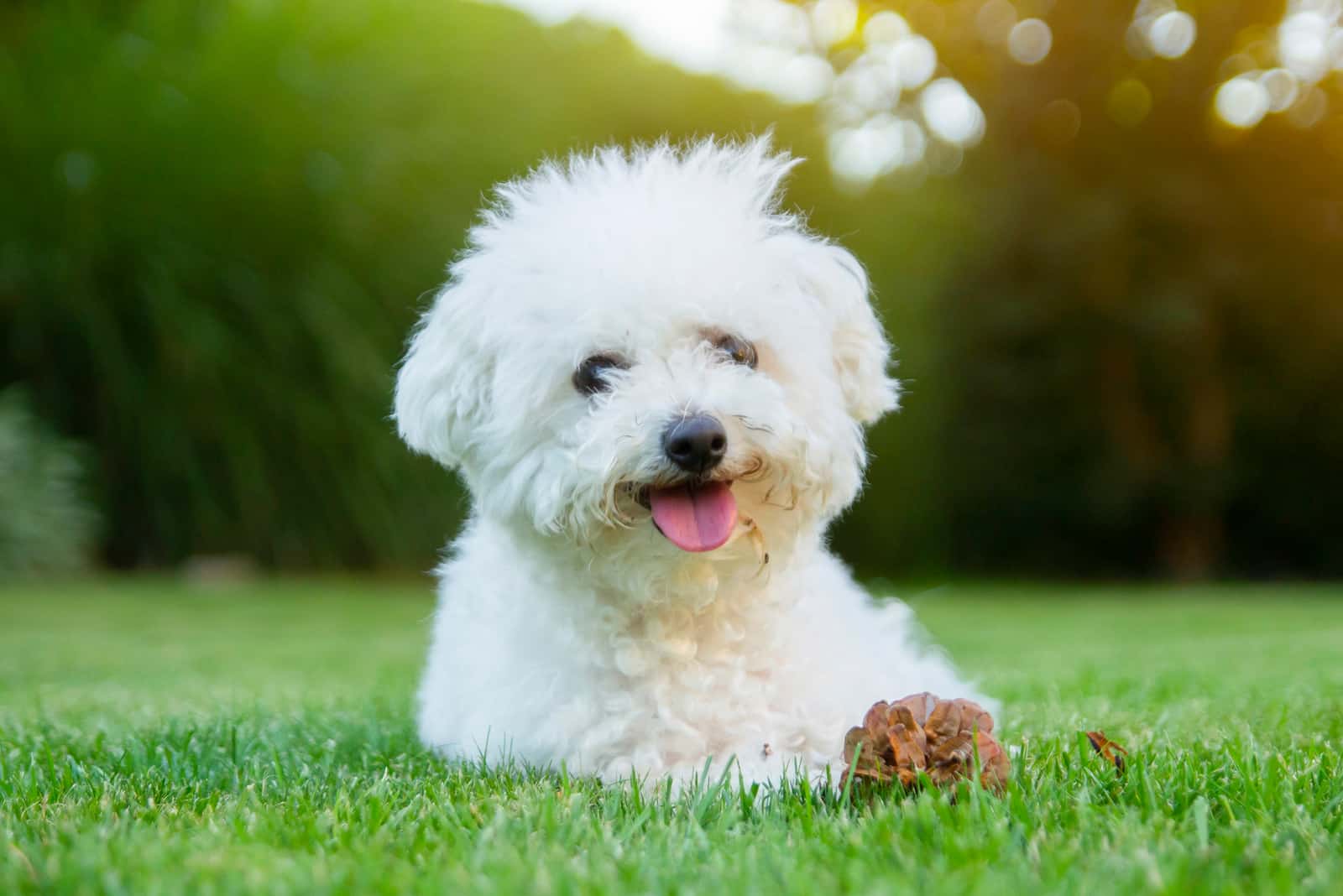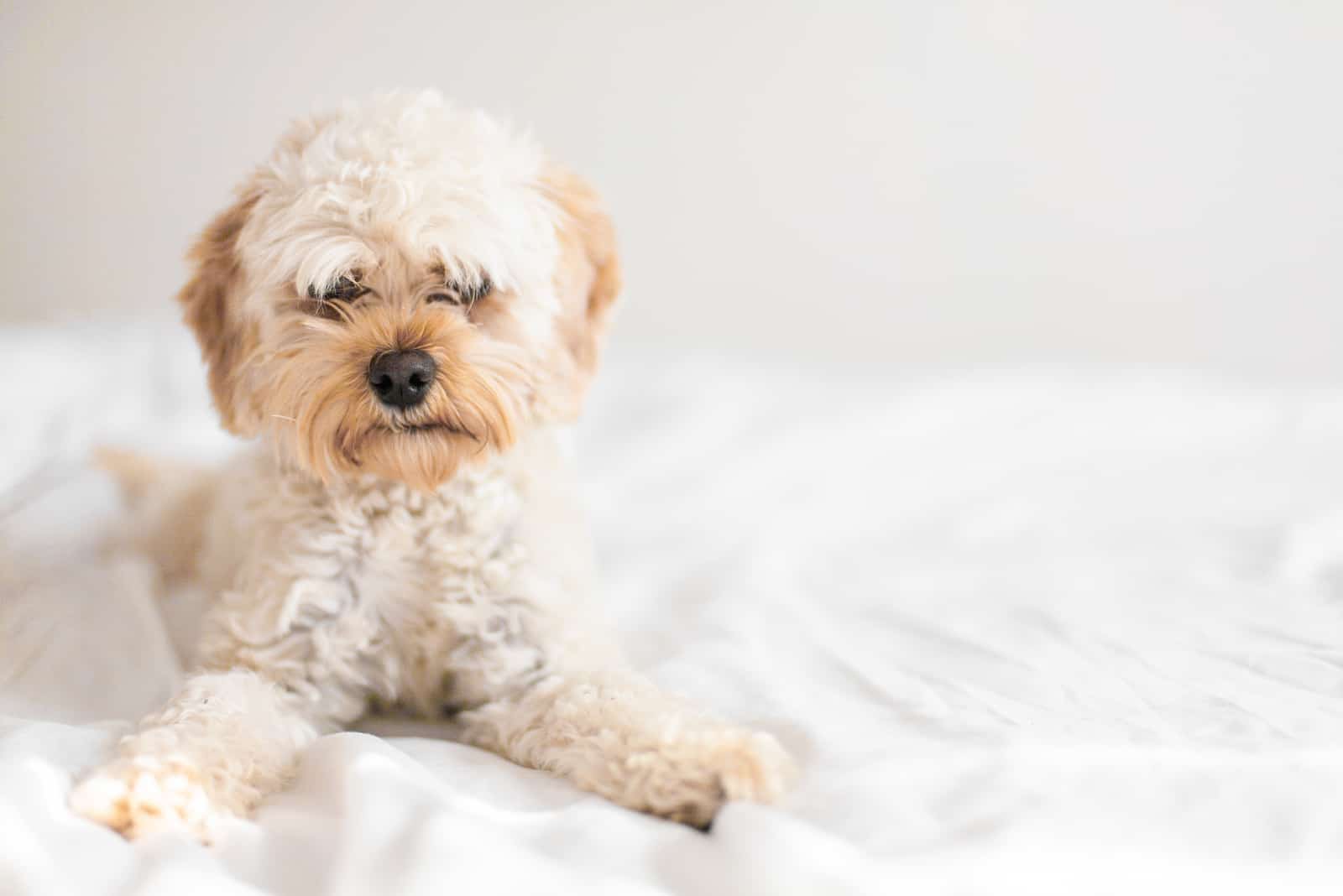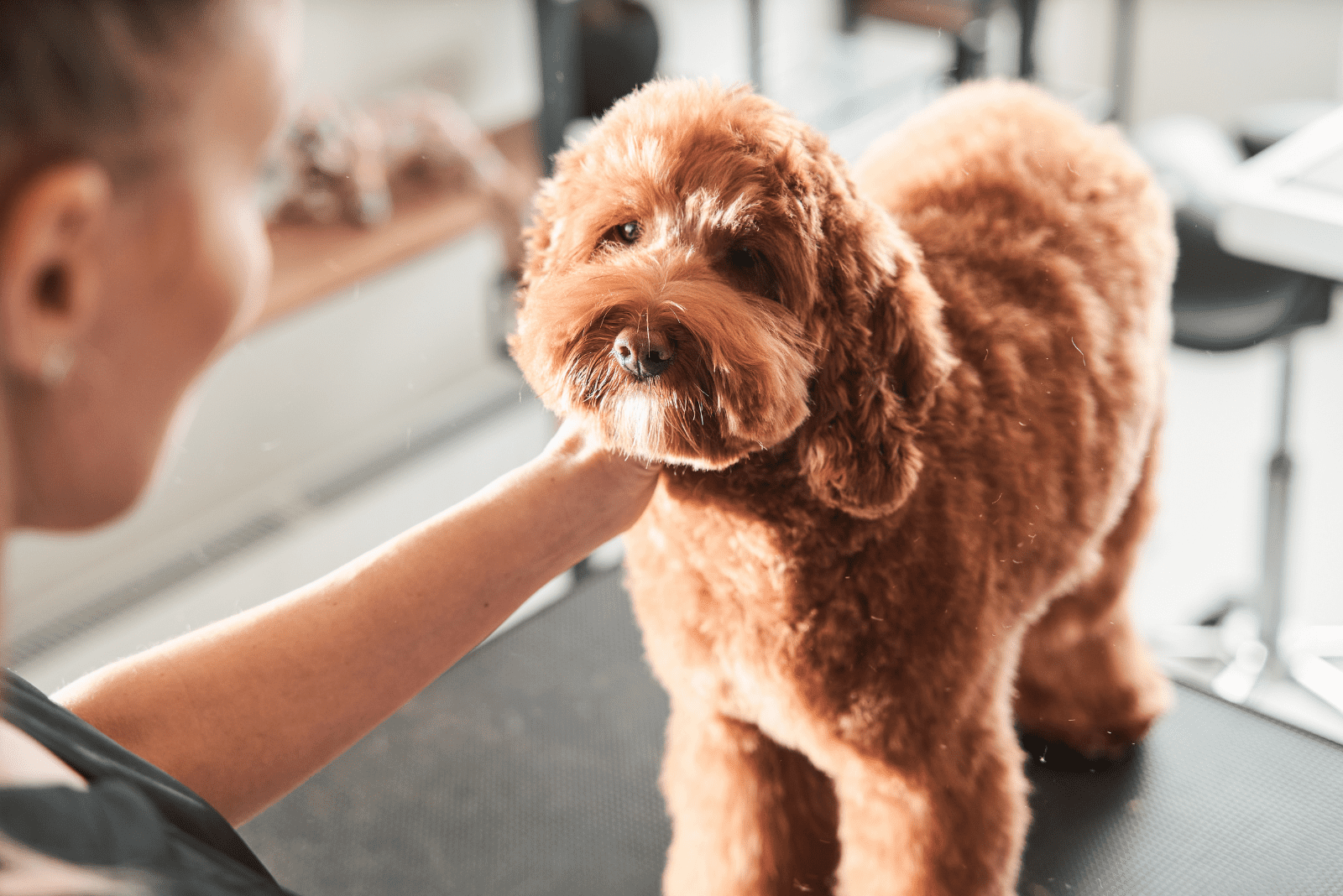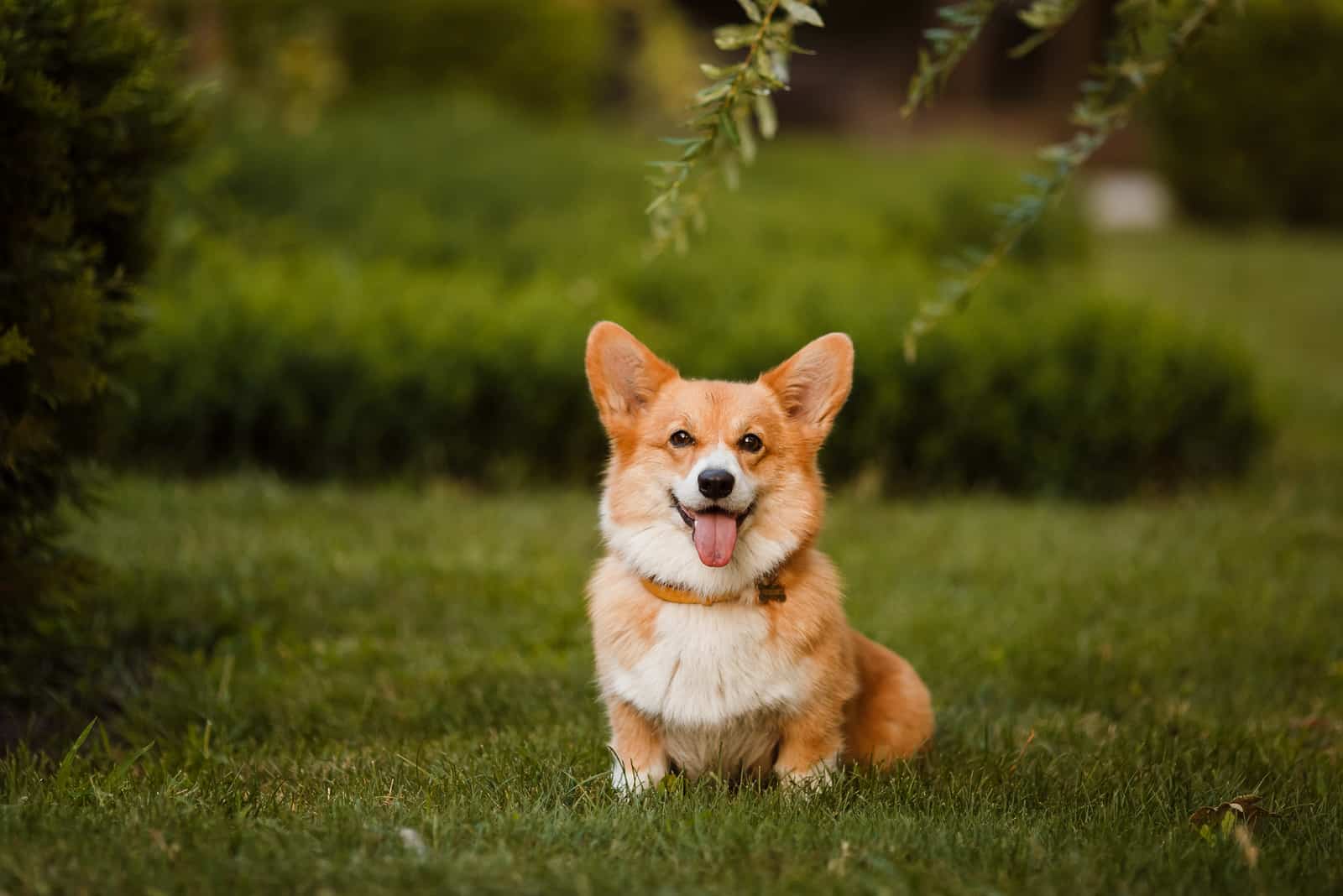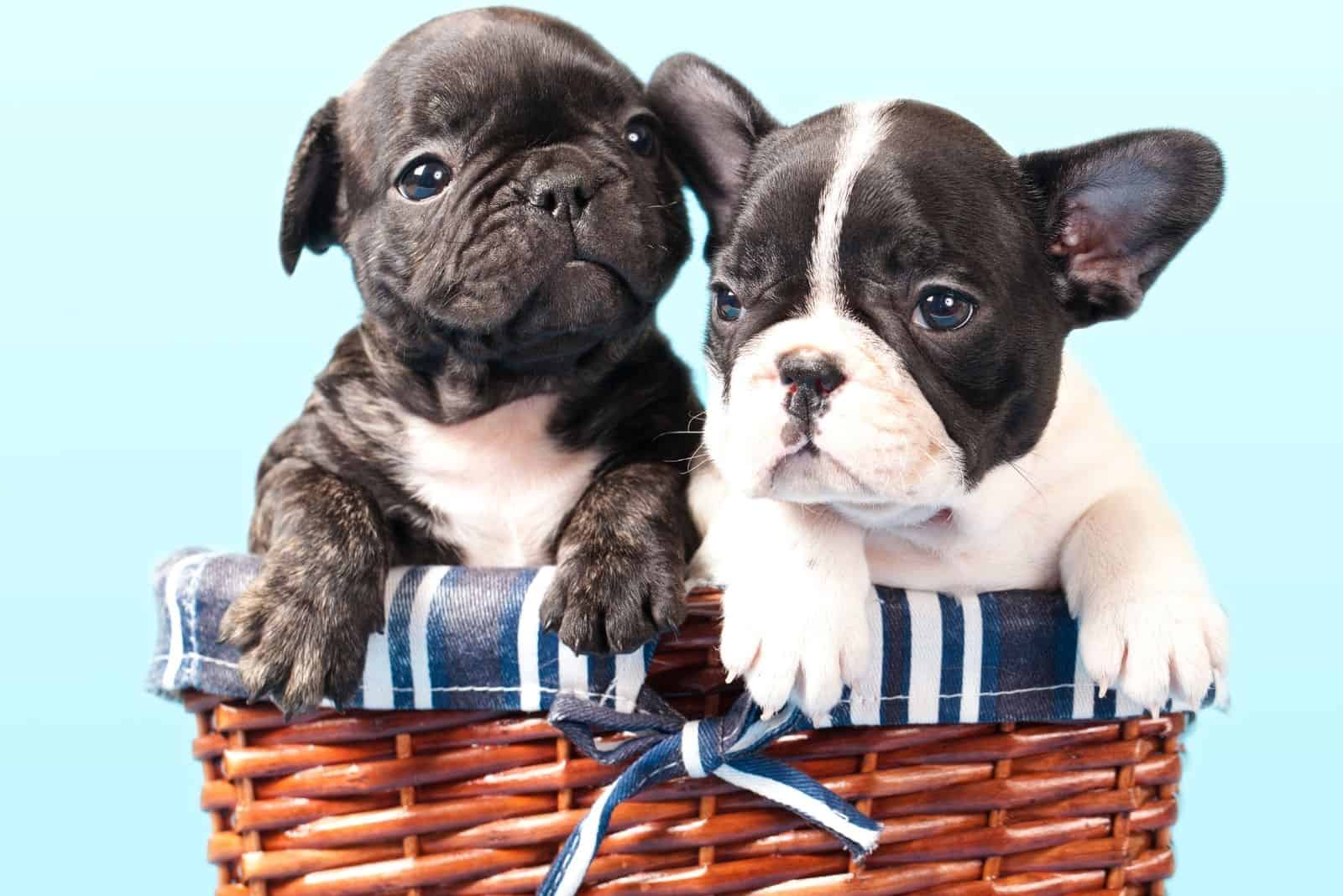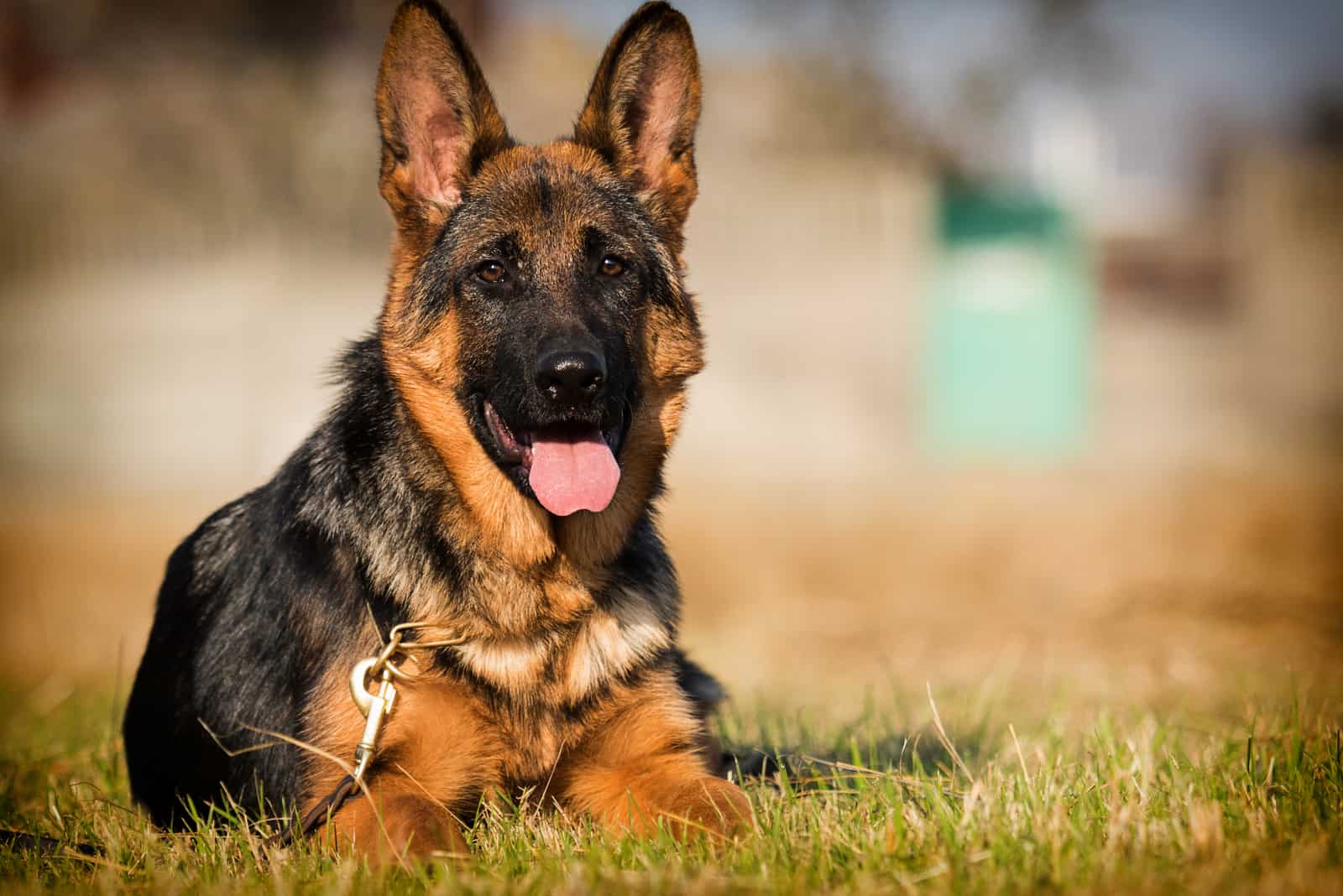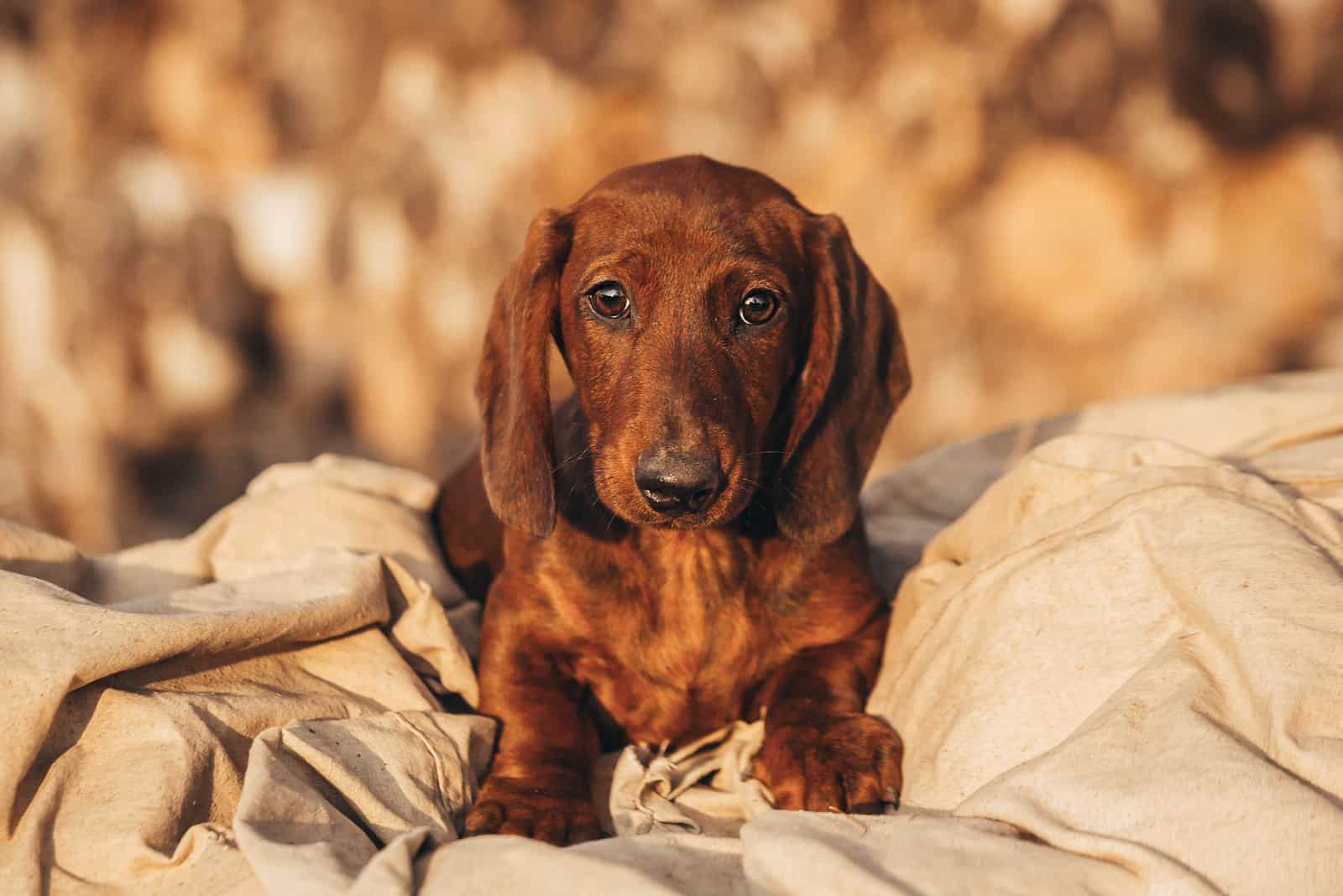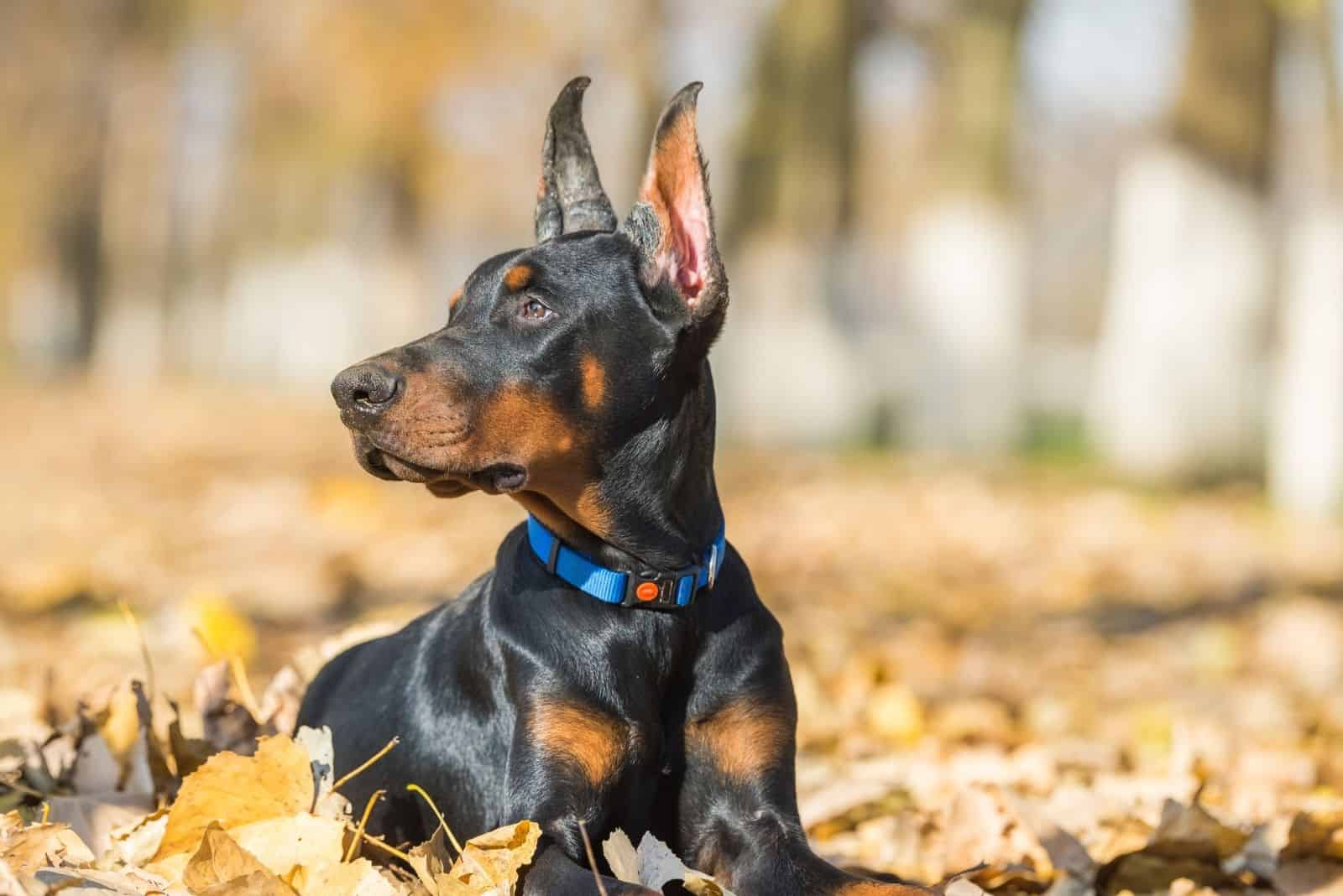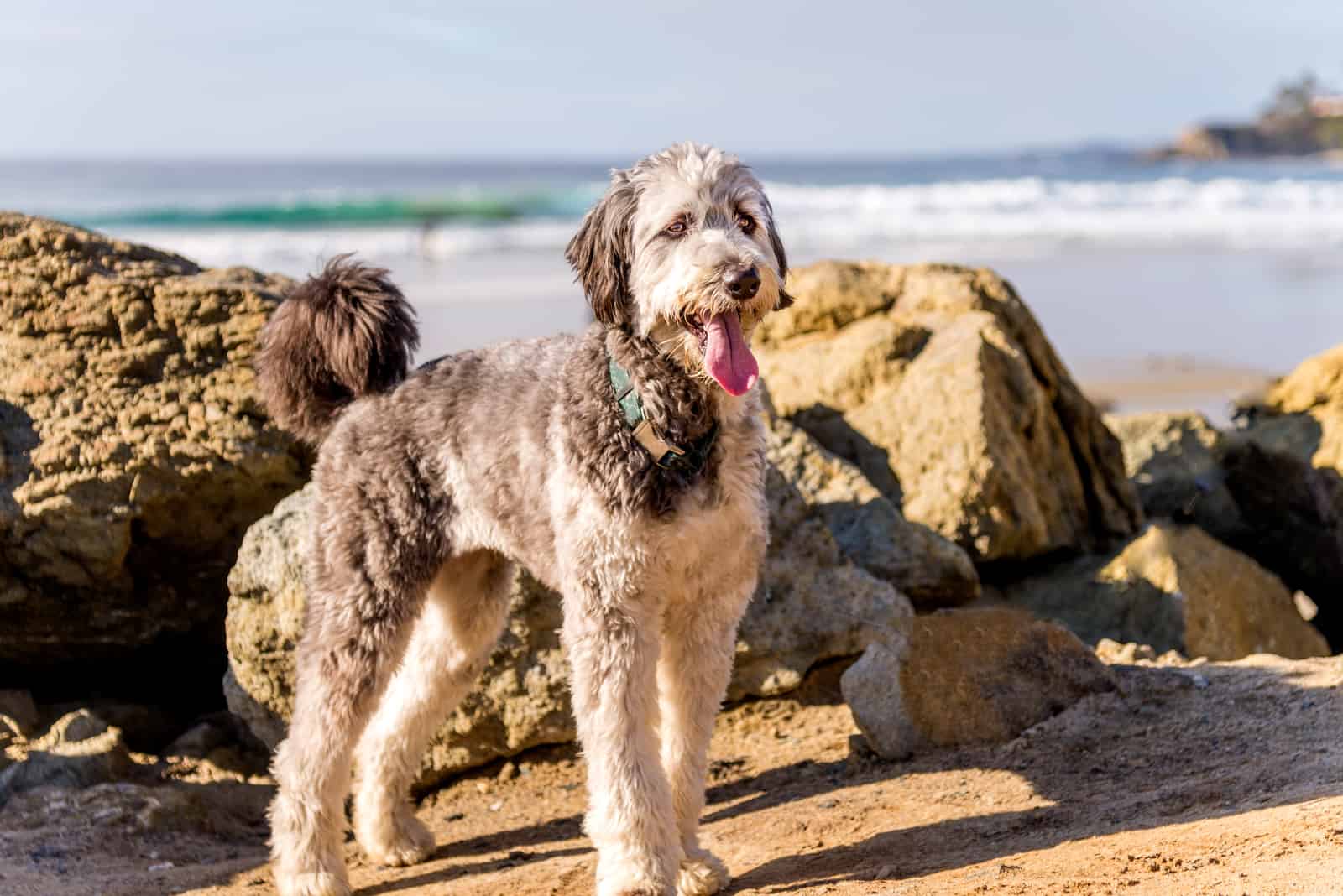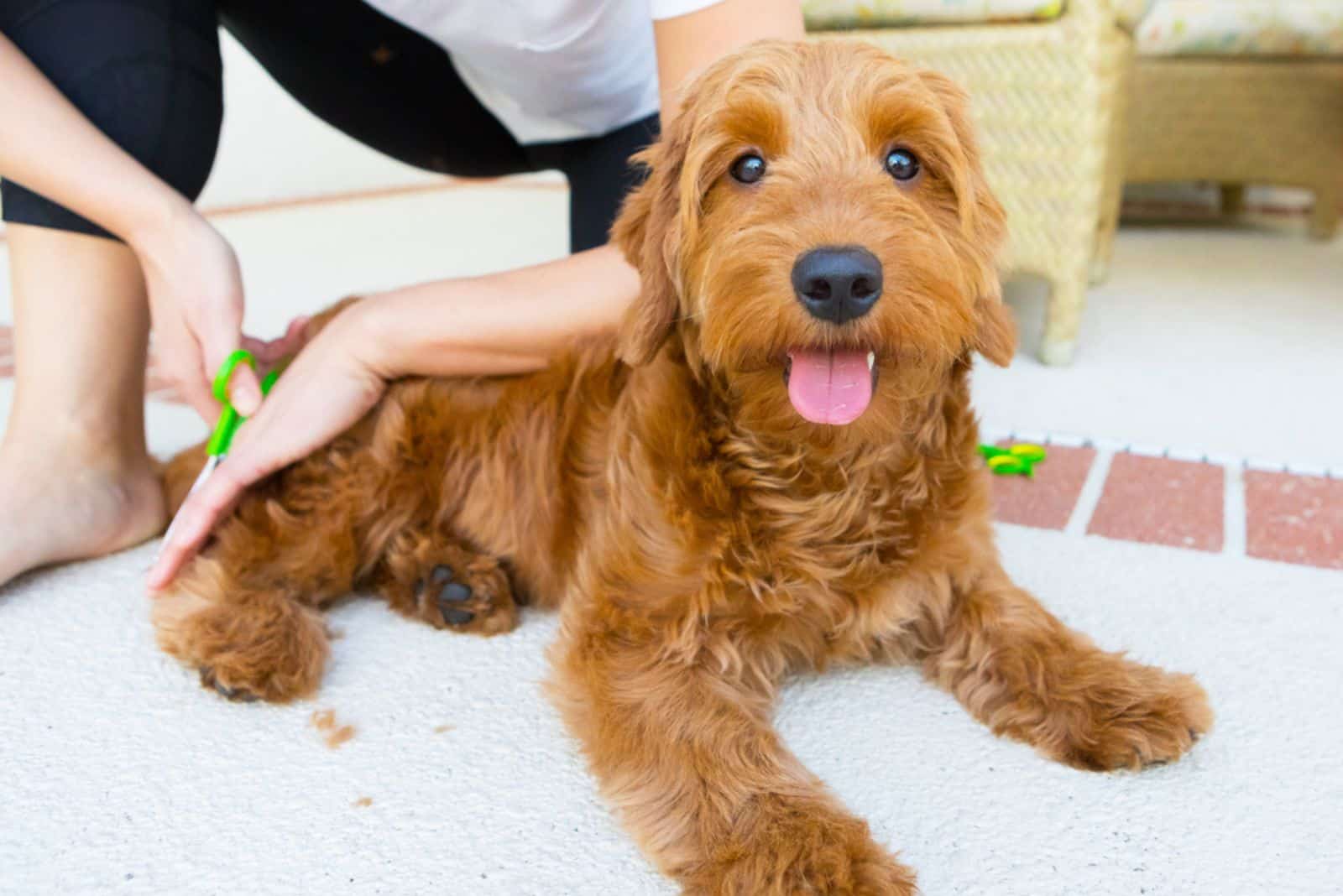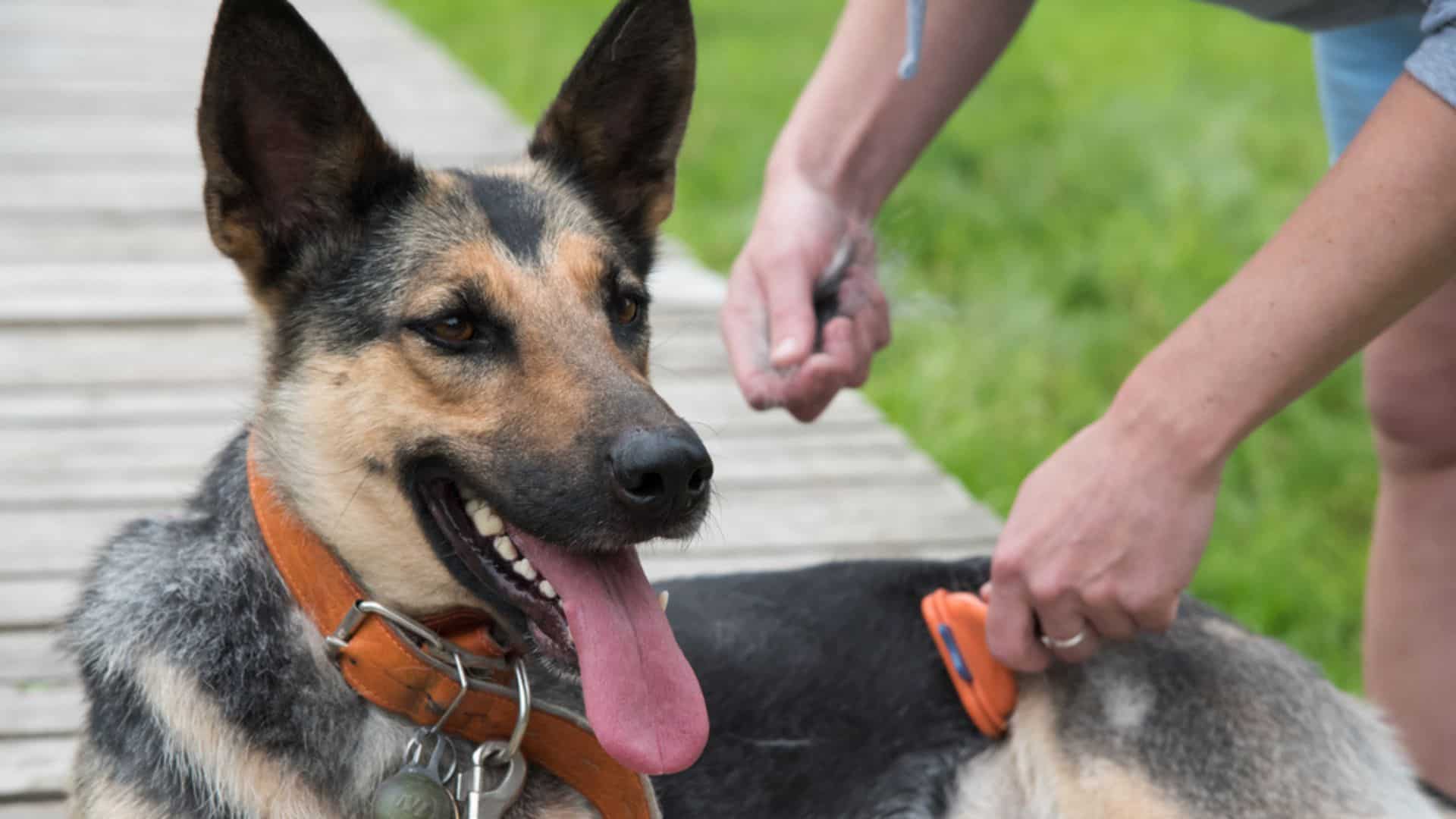Dog allergies are some of the worst things that can happen to a dog lover! There is nothing worse than realizing you are allergic to your favorite animal, and that you cannot get a family companion you want and love.
Fortunately, just because a person is allergic to one dog breed, or even one particular dog, doesn’t necessarily mean they are allergic to every single canine out there. Some dog breeds are more likely to cause allergic reactions than others.
So what about Doberman Pinschers? Are they a good choice for people with dog allergies, or are they among dogs you should avoid?
If you would like to know are Dobermans hypoallergenic, we’ll let you know all the answers. We’ll also talk about some misconceptions about hypoallergenic dogs and explain whether hypoallergenic dogs even exist.
Let’s get straight into it:
Are Dobermans Hypoallergenic?
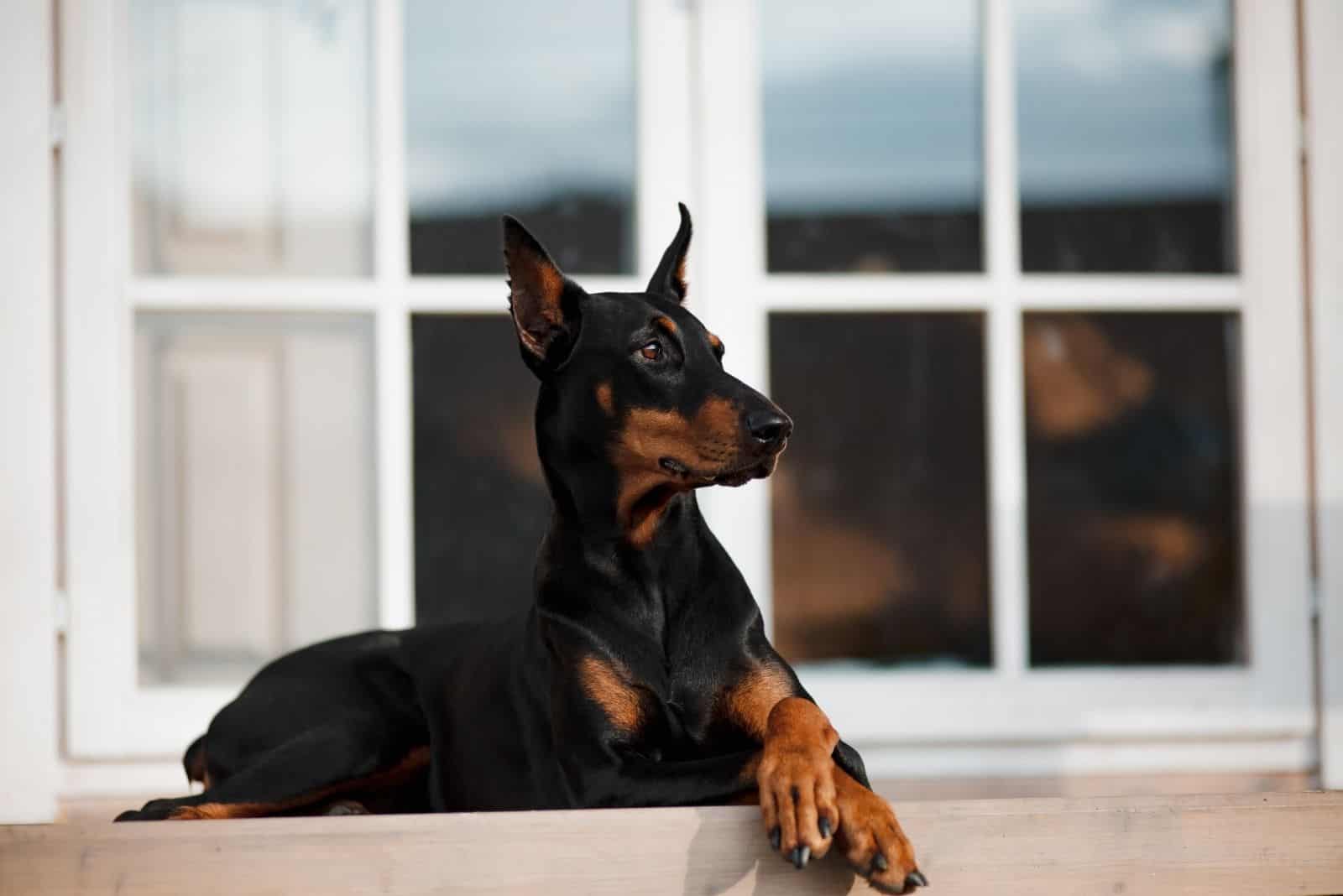
In short: No, Dobermans are not hypoallergenic dogs. They are not suitable for people who are prone to dog allergies, as they can make the symptoms worse.
Most Doberman owners with dog allergies have reported experiencing numerous signs of allergies, including even skin irritations!
As such, we would argue that Dobermans are a very bad choice if you’re having problems with dog hair.
However, to fully understand the answer to the question “Are Dobermans hypoallergenic?”, you need to understand the meaning of the word hypoallergenic.
Can a dog be hypoallergenic?
Hypoallergenic is a word you can see plastered on many places and products. Foods, skincare products, clothes – everything is becoming hypoallergenic! As such, many dog owners and breeders have started calling various dog breeds hypoallergenic. This can also lead to the question of are Dobermans hypoallergenic.
Hypoallergenic means that the product is free of any allergens. In other words, it doesn’t contain anything that can trigger an allergic reaction.
So, what about dogs? Can a dog be hypoallergenic?
If you struggle with allergies, you might have noticed that the symptoms get worse every time you breathe in dog hair. This can make you think that the issue lies in dog hair.
But, things aren’t that simple.
Believe it or not, it isn’t dog hair that’s causing you problems – at least not directly. Instead, the problem lies in a specific dog protein found in the dog’s urine, saliva, and dander (dead skin flakes).
Most of us don’t get in contact with the dog’s urine, so this isn’t something that we’ll talk about.
However, a dog’s saliva and, more importantly, dander, can get stuck onto a dog’s hair. As the hair flies around, it also spreads dander. As such, you might think that the dog hair is causing you problems, but instead, it’s the dander that’s the true cause of the issues.
This is why dogs that don’t shed might cause fewer problems compared to breeds that are high shedding. Dead skin cells won’t have a way to spread around without loose hairs, so they won’t get into your respiratory system.
However, all dogs drool to a certain extent, and all dogs excrete urine. Also, all dogs have dander, although breeds with dry skin will flake more compared to other ones.
For a dog to truly be hypoallergenic, he shouldn’t produce any allergens. This is simply impossible.
As such, there isn’t such a thing as a hypoallergenic dog.
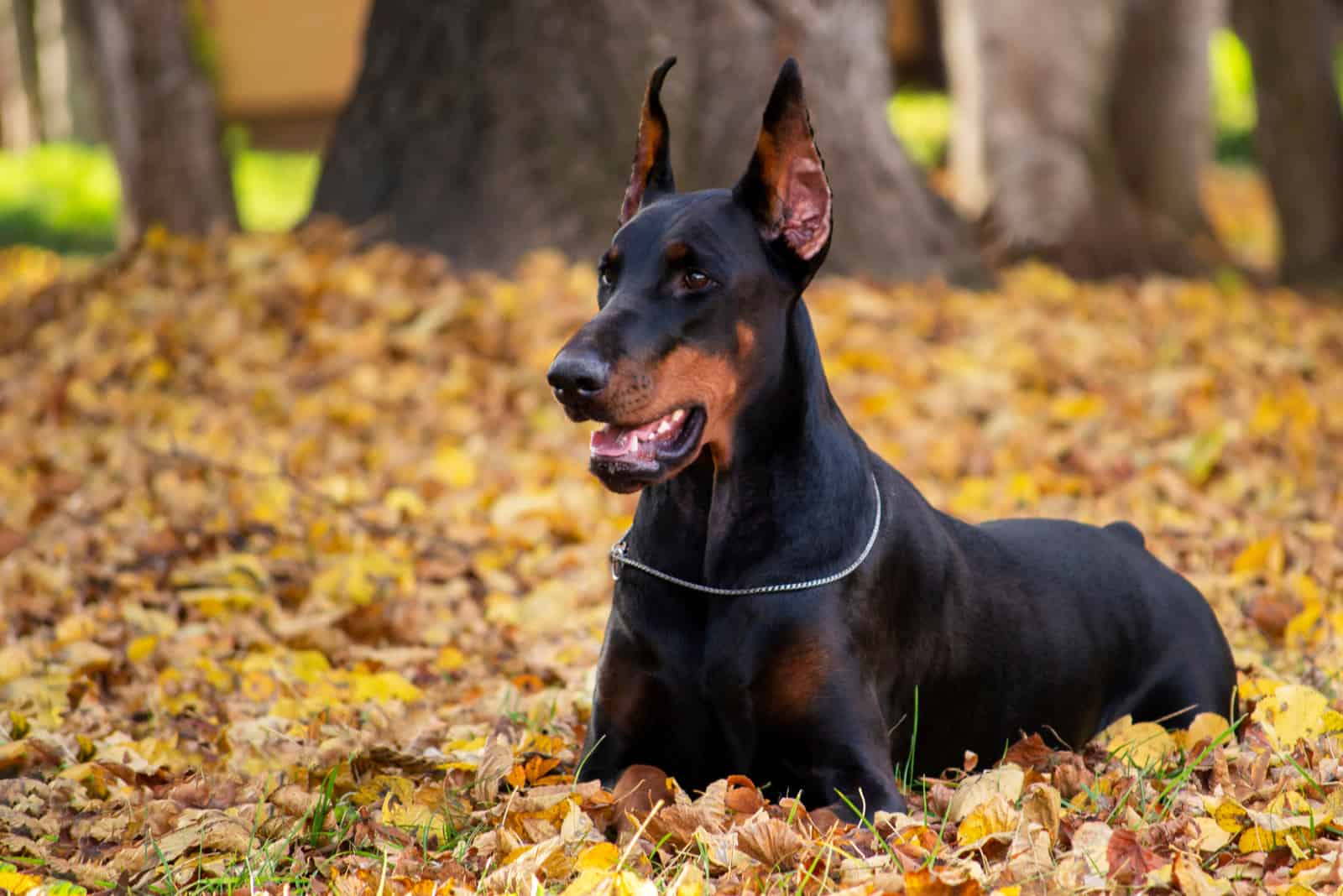
What does this mean for Dobermans?
Just because a truly hypoallergenic dog doesn’t exist, doesn’t mean that you should go and buy any dog regardless of your allergies. Some dog breeds have proven to cause fewer problems than the other ones.
So, just because you have learned that all dogs might cause issues while wondering are Dobermans hypoallergenic doesn’t change the fact that this dog breed is a bad choice for allergy sufferers.
Is a Doberman Poodle mix hypoallergenic?
Many people who would want to get a specific breed but are afraid due to their allergies try to get their hands on a Poodle mix with that breed.
As such, you might think that a Doberdoodle, also known as the Doodleman Pinscher, is a good choice. However, things aren’t that straightforward here, as well.
This is because mixed-breed dogs can get features from both of their parent breeds. You cannot simply pick a trait and say that you want your Poodle mix to have this specific feature.
The genetic pool is always a lottery. For example, in a litter of Doberdoodle puppies, you might get a dog with a straight coat and a dog with a curly coat, just like Poodles have.
A dog with a straight coat of a Doberman will experience a much larger shedding amount than the dog that inherited a curly coat from his Poodle parent.
Other Doberdoodles might have a wavy coat that will shed, but not that much.
So, not only do you know the answer to ‘Are Dobermans hypoallergenic’, but there is a chance that all Doberman mixes will also cause you issues. No one can guarantee you the opposite case scenario.
Still, mixing a dog breed with a purebred Poodle is likely to reduce the shedding amount and make a puppy a bit more allergy-friendly.
Doberman Coat Type And Shedding Amount
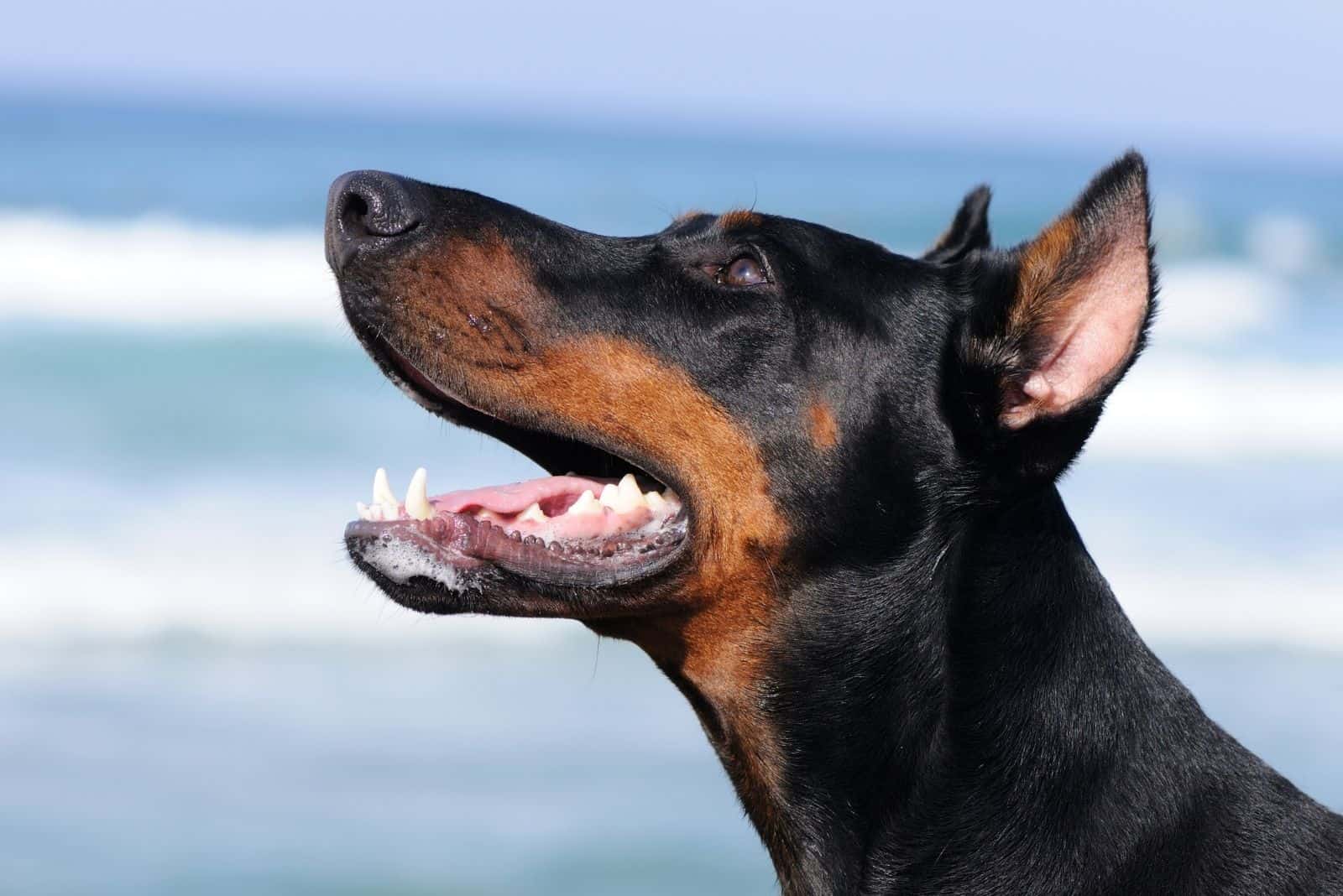
Doberman Pinschers are single-coated dogs. This means that, unlike dogs with a double coat, they don’t have an outercoat and undercoat, but a single coat layer.
Their coat is short and sleek, and you’ll know how healthy a dog is by the shine its coat has. A healthy Dobie’s coat will always be shiny and glossy.
According to the American Kennel Club (AKC), Doberman’s coat comes in these colors:
• Black
• Dark red
• Blue
• Fawn
Rust-colored markings, the so-called Doberman markings, are also a necessity.
Despite its short coat, this dog does shed. However, the shedding amount is minimal to moderate, and you shouldn’t expect any high amounts of shedding.
Also, as they have a single layer of hair, Dobermans aren’t known for being seasonal shedders. In other words, you shouldn’t expect the shedding amount to increase in spring and fall.
This also means that Dobermans don’t require too much maintenance or grooming. Giving them a few good brushes a week is all it takes to keep their shedding amount at bay.
Also, you don’t need to take your Doberman to the professional groomer – unless you really want to. They don’t require haircuts, and you’ll likely be able to handle them on your own.
Reading all of this can make you once again think Are Dobermans hypoallergenic? Despite this – no, they are not a good fit for allergy sufferers. We’ll explain why in a bit.
So, How Dobermans Cause Allergies?
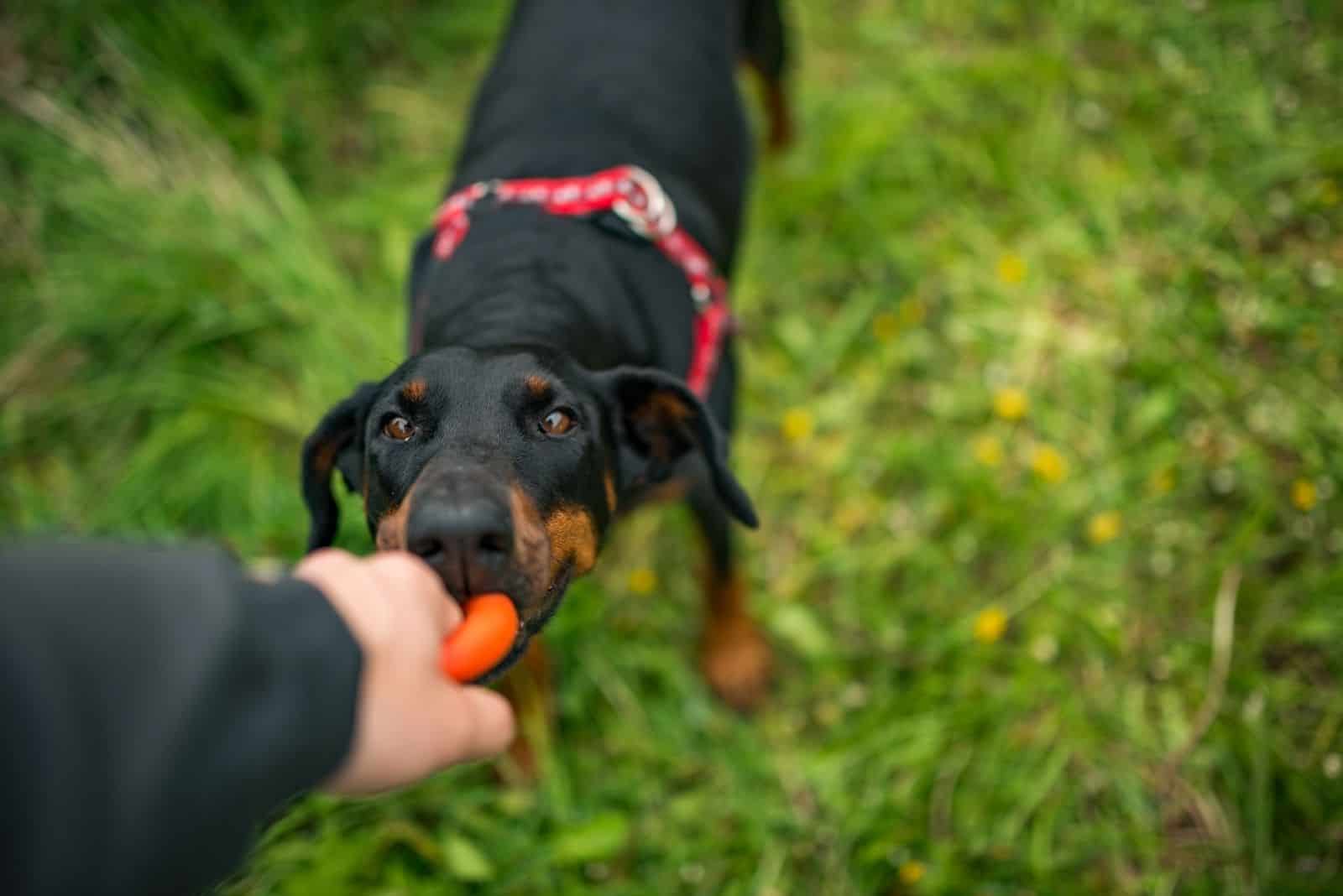
As you can see, Dobermans don’t shed too much, but they still shed. They don’t have excessively dry skin, as well, so they do not produce high dander levels. Not just that, but they are very clean and hate getting themselves dirty.
So, how come they are not good for allergy sufferers?
First and foremost, Dobermans are large dogs. Even the slightest amount of shedding is much worse on large dogs as the amount of loose hairs is much more significant.
Another problem lies in the type of the Doberman’s coat. These dogs have short, thick fur that can be unusually sharp. It can poke the top skin layer, giving you irritations or even hives.
It isn’t unusual for Doberman owners who walk barefoot to experience this on their feet, and you might notice the same on your hands and arms when playing with a Doberman dog.
This isn’t a huge problem for people who don’t have sensitive skin, but it’s still something worth noting.
Next, despite Dobermans being very clean, they are still active dogs that love to run around everywhere. They can easily roll in all sorts of debris, including irritant plants such as poison ivy or grass.
Once they come back into your home, they’ll carry these plants together with them, causing problems and reactions.
Another two reasons lie in the fact that Dobermans are very sensitive dogs. Yes, we are talking about those big guard dogs everyone is afraid of.
First off, Dobies have rather sensitive skin. If they get a rash or skin bumps, this will result in a high amount of dander which will worsen your allergy symptoms. Most skin irritants cause dry skin, which results in flakes.
At the same time, they are prone to various types of allergies themselves – most notably, food allergies. However, they are also sensitive to pollen, dust, and various other irritants.
Just like humans, when canines get an allergic reaction, they are likely to sneeze. This will spread drool everywhere!
In general, though, Dobies are more likely to cause skin irritations than sinus irritations. They will easily make your skin itch or irritated, but they aren’t likely to lead to breathing problems.
Fortunately, this means that they can be a decent choice for allergy sufferers who only struggle with breathing problems. If you don’t have sensitive skin, you might be able to keep a Doberman as a companion.
Still, even if we were to consider that dogs can be hypoallergenic, Dobies still wouldn’t make the cut due to the skin problems they can cause.
What Dog Should You Get Instead?
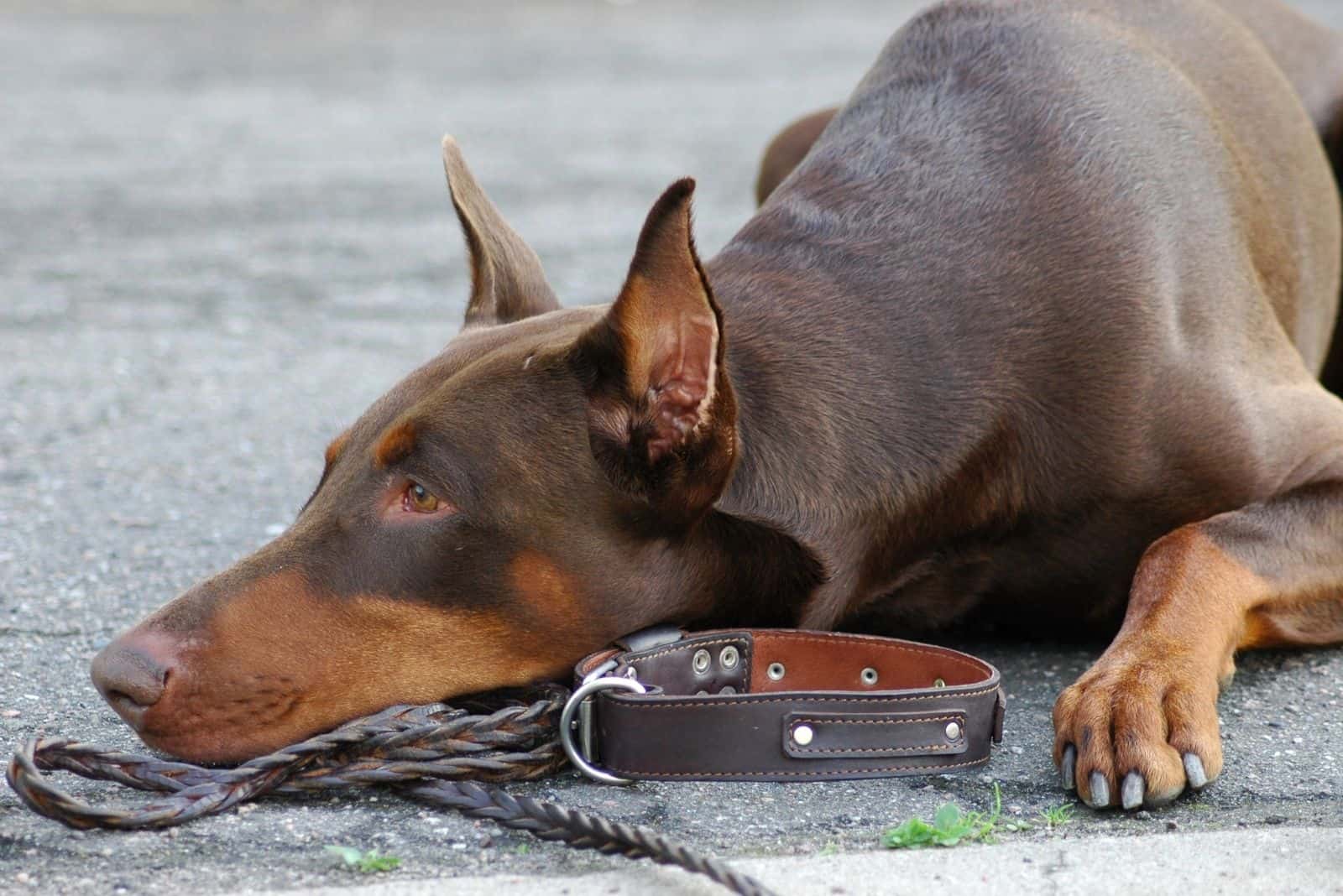
Just because you’re dealing with dog allergies doesn’t mean you shouldn’t become a dog owner. There are many ways in which you can help reduce the symptoms of allergies that we’ll talk about in a bit.
If you worry that a Doberman will cause you issues, your next best option is to get one of the hypoallergenic dog breeds.
While we’ve already mentioned that all dogs can cause allergies due to dander, saliva, and urine, some breeds are known to cause fewer problems than the other ones.
Some of these breeds are:
• Poodle
• Bichon Frise
• American Hairless Terrier
• Giant Schnauzer
• Portuguese Water Dog
• Afghan Hound
• Bedlington Terrier
• Chinese Crested
• Maltese
• Irish Water Spaniel
• Coton De Tulear
• Kerry Blue Terrier
• Soft Coated Wheaten Terrier
• Peruvian Inca Orchid
As you can notice, most of these pups either have a silky coat, curly coat, or are hairless. They are known for producing less dander than dogs such as Doberman Pinchshers.
While we’ve mentioned that it isn’t dog hair but dander that’s causing allergies, in hairless dogs, that dander doesn’t have how to fly around as there are no hairs it can get stuck on.
Not just that, but most hairless dogs require that you put oils on their skin regularly, which means they won’t have as dry skin like most other breeds.
This makes many people think that any short-haired breed of dog is allergy-friendly. However, this isn’t always the case.
For some dogs, it’s easy to see that they will cause issues. German Shepherds and Golden Retrievers noticeably shed a lot, and it’s easy to see that they’ll cause issues.
Other dogs, like Bulldogs or Greyhounds, look like they have a non-shedding coat but they are, in fact, moderate shedders. As such, they are not the best breed for people with pet allergies, despite how they might seem.
It’s important to do some research so you can find the best dog for your situation.
Pet Allergy Symptoms
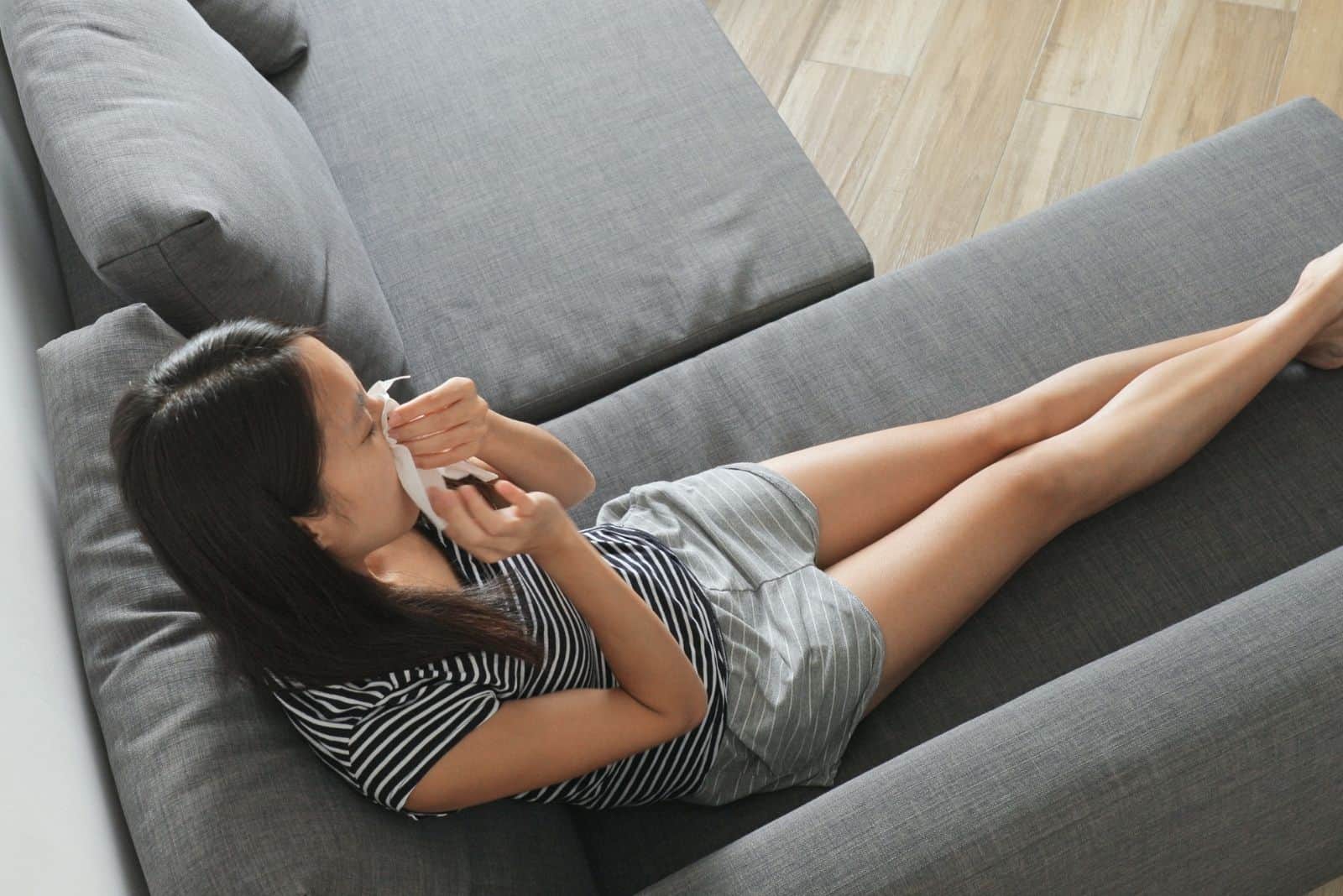
Sometimes, people are not aware that their Doberman Pinschers are causing them problems. They might think that they are sick often or that they are catching a cold. Instead, it is their Dobie that is causing them issues.
For example, my husband had to go see a doctor thinking they are catching the flu, but it turns out that our pooch is giving him breathing issues.
The proteins in the dog’s urine, skin cells, or saliva are known to cause problems similar to hay fever or even asthma.
When you are exposed to dander found on a dog’s hair, this will trigger an allergic reaction. This can occur at any age. You don’t have to be born with a dog allergy for it to happen once you are an adult or even a senior.
Most allergies will cause the inflammation of nasal passages. This leads to symptoms such as:
• Sneezing.
• Wheezing.
• Runny nose.
• Red, watery, itchy eyes.
• Postnasal drip.
• Nasal congestion.
• Cough.
• Itchy nose, throat, ears, or roof of the mouth.
• Facial pressure.
• Swollen skin under the eyes.
• Problems with sleeping.
Some dog breeds, such as Dobermans, are known to cause unusual allergy symptoms that are expressed on the skin. This includes skin inflammation or allergic dermatitis, which will have symptoms such as hives, eczema, and itchy skin.
Dealing With Dog Allergies
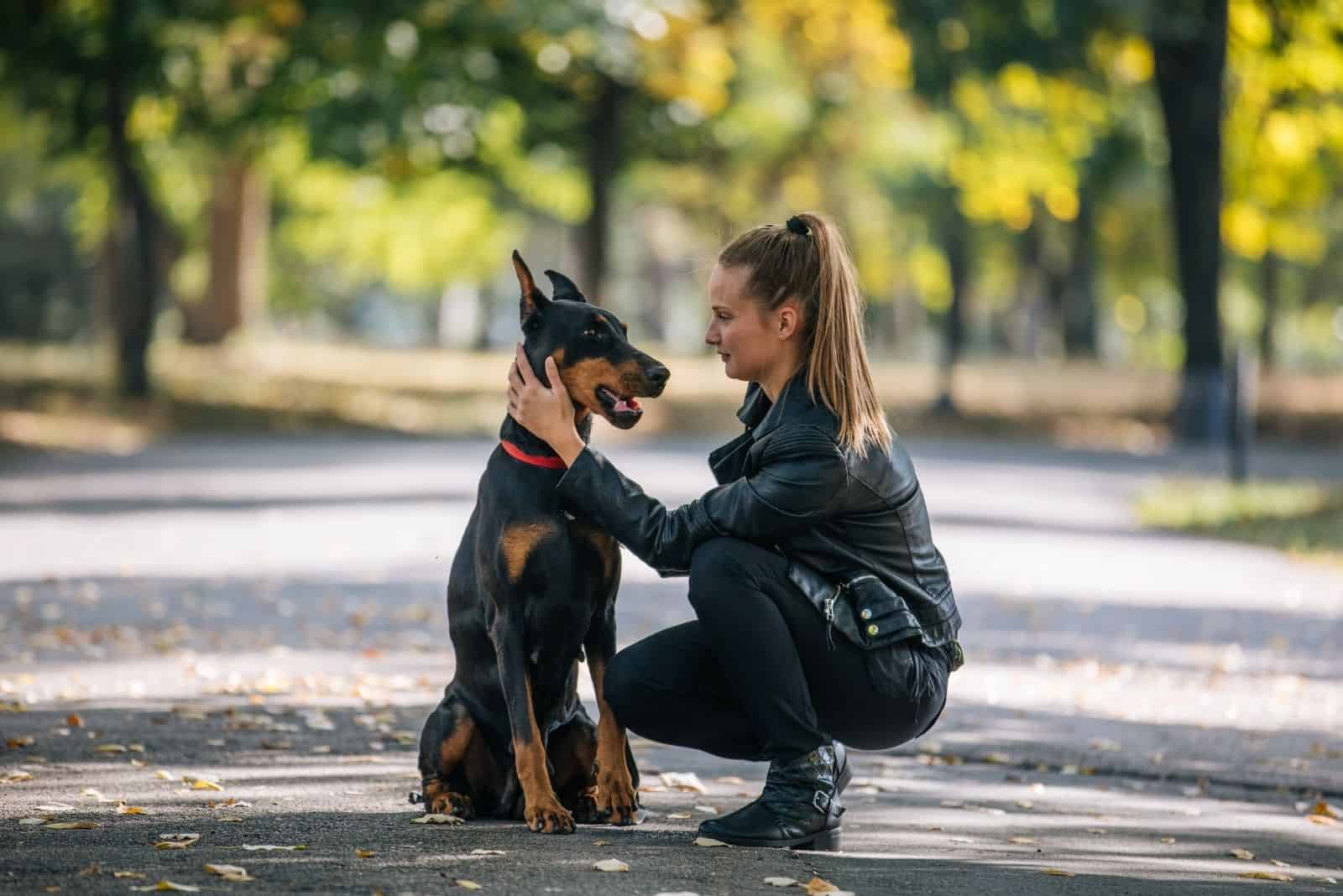
Just because you know are Dobermans hypoallergenic doesn’t mean you shouldn’t have them as pets. There are a few ways in which you can reduce the chances of allergies, so you can spend time with your family dog regardless.
Maybe you’ve bought yourself a Doberman Pinscher and realized he’s giving you allergies. Maybe you even had your dog for a while and you’ve just now started to experience problems.
The truth is, you might not be allergic to your dog while he is a puppy, but once he grows up the allergies will kick in – or vice versa.
The puppy’s coat and the adult dog’s coat are quite different from one another. You might have issues with your Doberman puppy, but once he gets his adult coat, allergies will disappear – or worsen.
This is why it might appear as if the allergies have suddenly started, but the truth is it is the dog’s coat that has changed.
Still, this isn’t a reason to find a new home for your beloved watchdog. There are many things you can do to try to manage the symptoms of allergies.
Here are a few things you can do:
• Reduce the amount of time and contact you have with your dog. This will reduce the direct contact with allergens.
• Keep your pooch away from your bedroom. If possible, restrict him to a few rooms only. While this won’t entirely keep allergens out of the rooms your dog can’t enter, it will reduce their amount and make everything easier to clean.
• If you hug, kiss, or pet your dog, wash your hands thoroughly with soap and water.
• Vacuum daily.
• Use HEPA cleaners in as many rooms as possible. If you have to limit it to one room, place it into your bedroom.
• Cover your furniture with throws or other form of upholstery covers.
• Follow the tips for reduced shedding that we’ll list in a little bit.
If all else fails, contact your local doctor or allergist who will prescribe antihistamines that will help you battle allergy symptoms.
Unfortunately, sometimes there is nothing you can do and the allergy signs will always be there. Still, it’s important to do all you can to help you coexist with your pup.
How To Reduce Shedding In Dogs?
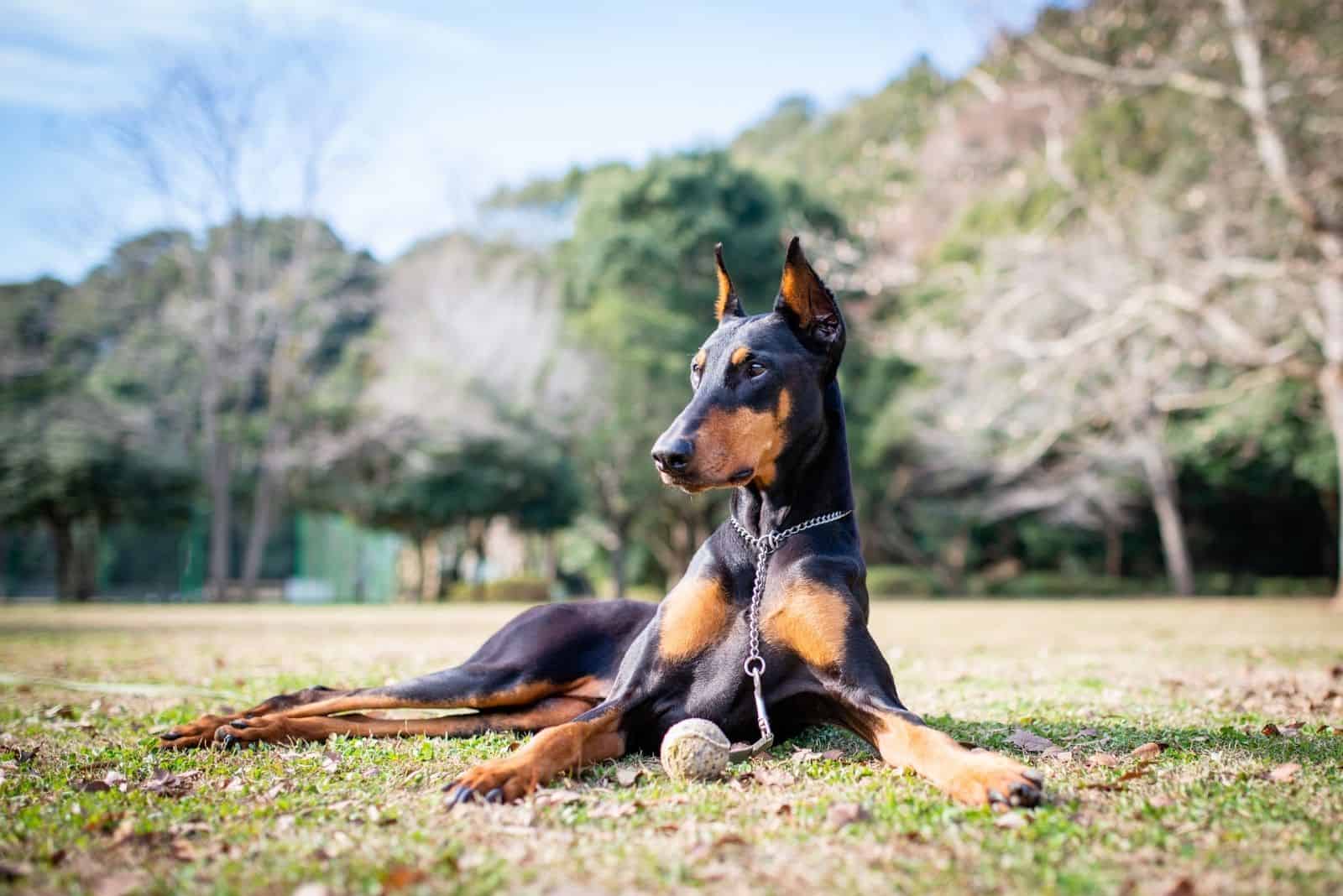
One of the best ways you can reduce your allergy problems is to reduce the amount of shedding in your Doberman.
Fortunately, Dobermans are not high-shedding dogs. Still, the small amount of shedding they do experience can cause breathing and skin problems. As such, it will help if you complete a few easy steps and reduce the amount of shedding they do have.
If you wondered Are Dobermans hypoallergenic? the first thing you probably had in mind is the shedding amount. Even dogs that shed really badly can benefit from a few grooming tips.
Here’s what they are:
Regular brushing
The most important thing you can do to reduce the amount of shedding is regular brushing.
Dobermans don’t necessarily require daily brushing due to their short coat. However, you should brush them at least three times a week.
Not just that, but you need to make sure you are using the proper brush. If you don’t use a brush that is adequate, you might hurt the dog’s sensitive skin, which will, in return, cause more dander. This will only make your allergies worse.
Infrequent bathing
Your pooch will require a bath from time to time. However, you shouldn’t go overboard. It is better to not bathe your pup too much.
This is because water can cause dry skin, resulting in more dander. Not to mention that this is uncomfortable for your Dobie!
The type of dog shampoo you’re using is also important. You cannot use human shampoo to bathe your dog. Our skin isn’t the same.
There is some discussion that the biggest difference between dog shampoo and human shampoo is in the pH value. However, many high-quality shampoos, both for humans and for dogs, have a pH value of 6.5.
The biggest difference is that the dog’s skin is much thinner and, as such, much more sensitive. This is because our skin is exposed to environmental factors, while the dog’s skin is protected by a thick layer of hair.
Human shampoos contain ingredients that can irritate a Doberman’s sensitive skin, which is why you should avoid them, no matter the pH value.
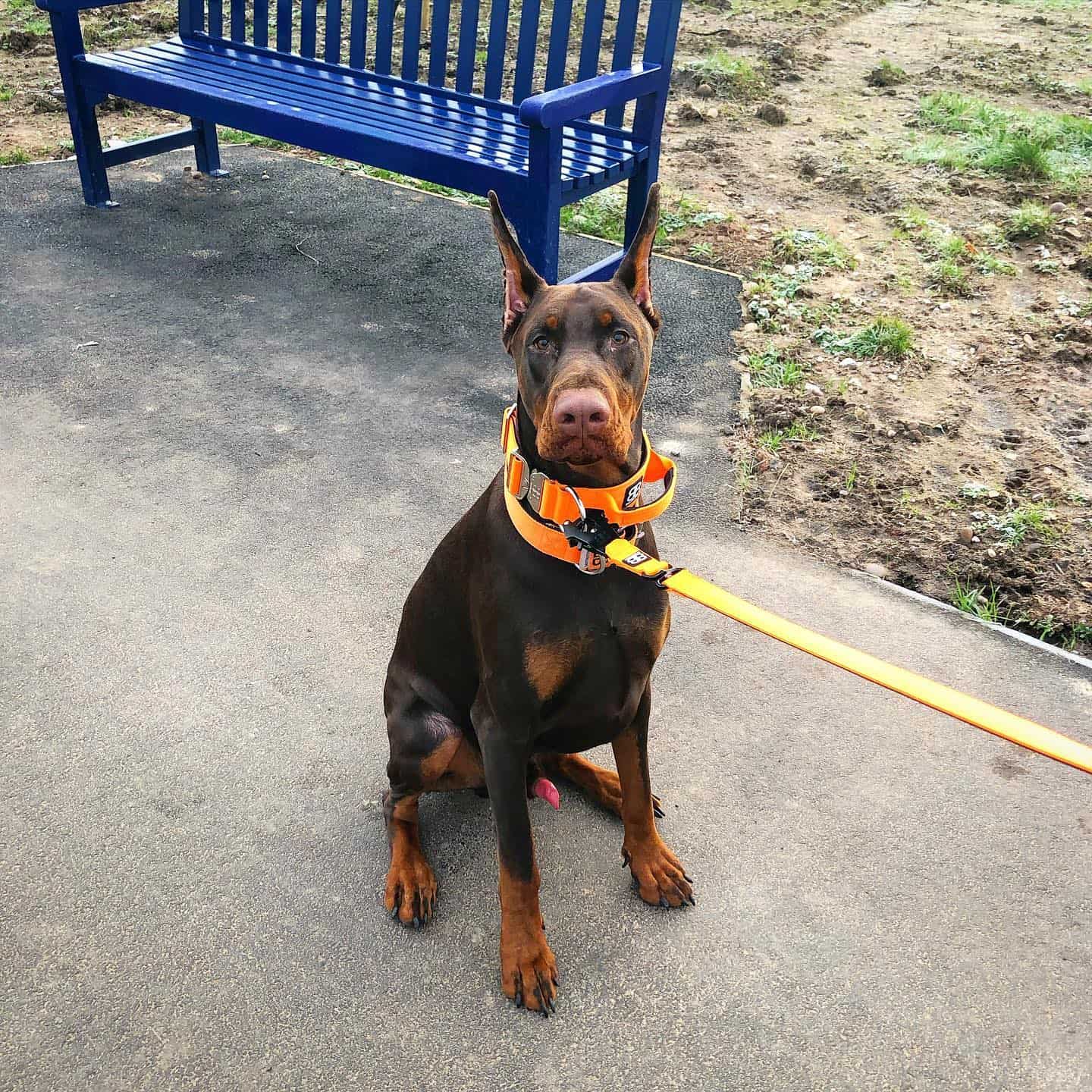
Photo from: @kratos_the_dobermann
Proper dog food
Another important factor when it comes to shedding amount is to feed your pooch proper dog food. Dog’s diet highly influences what his coat will look like.
If you feed your dog improper dog food, his coat will be the first to suffer. It will not only lose its shine, but it will start shedding excessively.
If you give your Dobie food rich with fatty acids – most notably, omega-3 and omega-6 amino acids – his coat will be as healthy as possible.
Not just that, but a dog needs to have a balanced diet so that he gets all the right nutrients. This means just the right amount of protein, carbs, fats, and as low sugars as possible.
Also, if your dog is underweight or obese, his coat likely isn’t going to be in the best condition.
Vitamins and minerals are also important for the dog’s overall health, which will result in a shiny, healthy coat.
A healthy coat means less shedding, which means a better outcome for your dog allergies.
Regular vet visits
Dobermans are dogs prone to skin problems and skin infections. As such, if you notice your doggie is shedding excessively, chances are he is struggling with some health condition.
In fact, no matter the dog breed, many health problems will reflect on the skin and hair. Even just a mere dog flu can cause a slight hair loss as the body will be fighting off the disease.
Not just that, but hair loss can be a sign of some severe health conditions, including even cancer.
Because of this, you should never skip vet checkups, and if you notice any sign of hair loss or changes in shedding amount in your Doberman Pinscher, you should take your pooch to the vet as soon as possible.
Can You Keep Dobermans If You Have Dog Allergies?
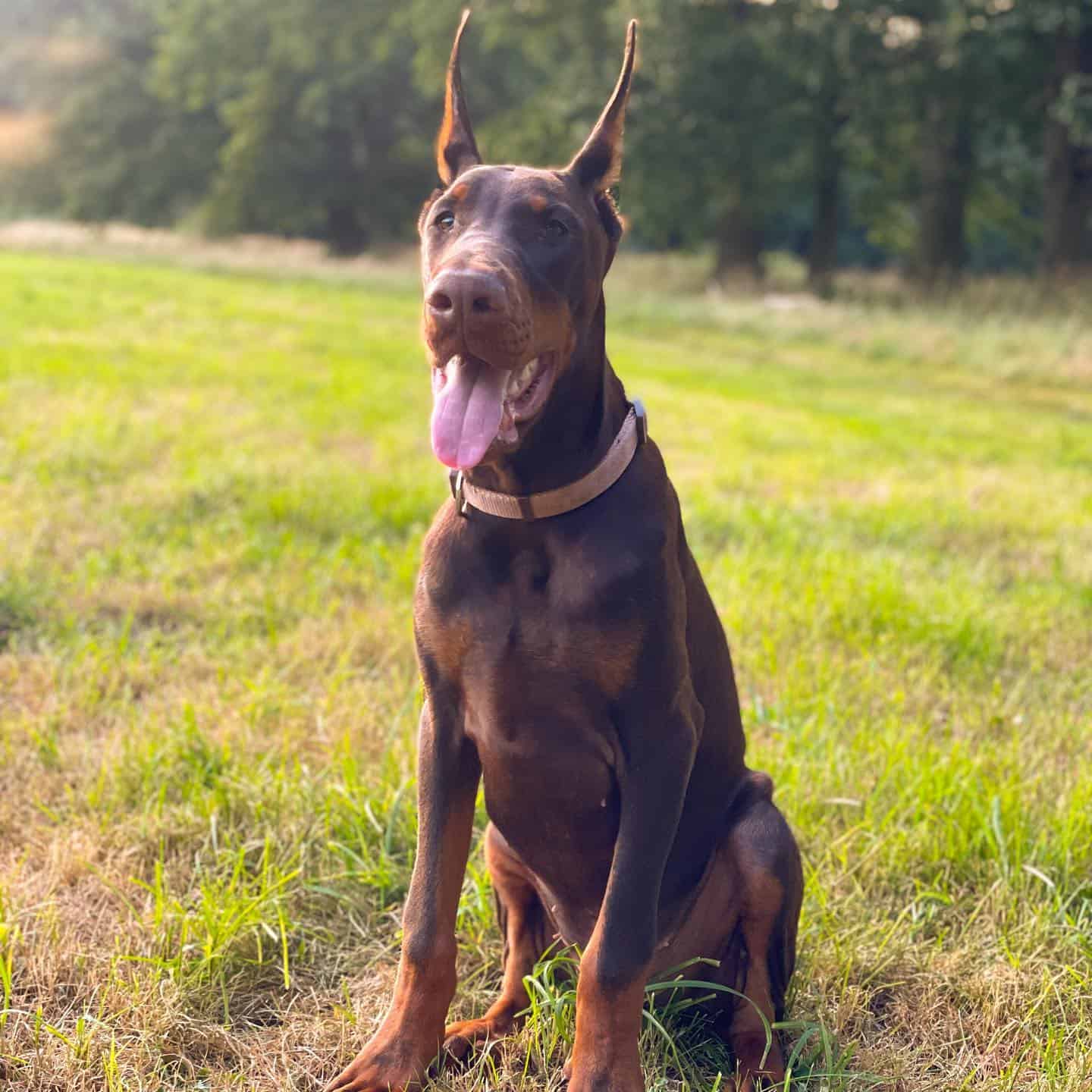
Photo from: @kratos_the_dobermann
Now you know the answer to Are Dobermans hypoallergenic? However, this isn’t where the discussion truly ends. You likely wonder should you get a Doberman, or if you have a Doberman, you wonder should you rehome him.
The truth is that this is entirely up to you.
Most people with mild to moderate pet allergies won’t have a problem with keeping Dobermans as pets. These dogs don’t shed too much and they are mostly clean.
However, their harsh, thin hairs can cause skin irritations, and as they do experience some shedding, people with severe allergies might still have breathing issues.
If you’d like to buy a Doberman but aren’t certain how you’ll react, the best option would be to spend some time with this amazing dog breed. This can give you an idea about whether they’ll cause you problems.
While each dog is individual and even two dogs of the same breed might have a different hair type, chances are that if one Doberman doesn’t give you an allergic reaction, others won’t, as well.
If you already have a Doberman but are experiencing some mild allergy symptoms, there is no need to rehome your beloved pet. Try some of our tips for managing allergies and see if they work. Maybe they can make your life easier.
If all else fails, try some antihistamines or allergy shots. Just remember to contact your doctor or healthcare provider beforehand. This will likely ease your symptoms and make things easier for you.
Unfortunately, if none of these methods work, maybe Dobermans aren’t the right dogs for you. There is no reason for you to risk your health or your dog’s wellbeing.
Find a relative or a good friend who might be able to take in your pooch. This way, you’ll stay close to him, but you’ll have a chance to keep your home free of allergens.
Read Next:
• 12 Best Hypoallergenic Guard Dogs – No Sneezing On The Watch
• 9 Best Doberman Breeders in Minnesota — Find Your Dobie
• 7 Great Doberman Breeders In Wisconsin

